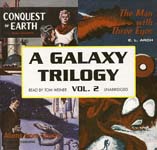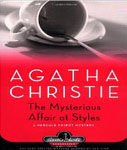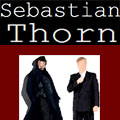
 The SFFaudio Podcast #098 – Scott and Jesse talk with Luke Burrage about the new audiobook releases. And we also play Philip K. Dick’s “Preserving Machine” game in which you pick a piece of music and transform it into an animal.
The SFFaudio Podcast #098 – Scott and Jesse talk with Luke Burrage about the new audiobook releases. And we also play Philip K. Dick’s “Preserving Machine” game in which you pick a piece of music and transform it into an animal.
Talked about on today’s show:
New releases, The Adjustment Bureau by Philip K. Dick, Kermode and Mayo’s Film Review, Roger Ebert, “Meet Cute”, Phil Gigante, The Stainless Steel Rat, Gregg Margarite, Russian Ark, Hermitage, The SFBRP Podcast, Your Movie Sucks, Dune, “This movie is a real mess, an incomprehensible, ugly, unstructured, pointless excursion into the murkier realms of one of the most confusing screenplays of all time.”, Korean movies mix humor, horror, drama, “the tone is off” in Shakespeare too, Unknown (a special edition of Out Of My Head), Berlin, Bronson Pinchot, Richard Matheson, On Stranger Tides, Bronson Pinchot has “a whole crew full of pirates in his mouth”, Audible.com, Beverly Hills Cop, Gideon’s Sword by Douglas Preston and Lincoln Child, Tom Clancy, Clive Cussler, Arthur C. Clarke’s Richter 10 by Mike McQuay, a Gene Wolfe writing exercise, The Unincorporated Man by Dani Kollin and Eytan Kollin |READ OUR REVIEW|, “trickster, prodigy, master thief”, techno-thriller-ish, Planet Of The Damned by Harry Harrison, West Of Eden, Bill The Galactic Hero, Long After Midnight by Ray Bradbury, Tantor Media, Michael Prichard, Drink Entire: Against the Madness of Crowds, The Odyssey of Homer, “he’s in a boat, Poseidon hates him, then he’s home”, the origins of Necromancy are in The Odyssey, Philip K. Dick was directly inspired by The Odyssey, An Improvised Life: A Memoir by Alan Arkin, James Randi, The Black Widowers, The Trapdoor Spiders, Isaac Asimov, the Amazing Larry, Luke jumps on giant balloons |VIDEO|, Galaxy Science Fiction magazine, Arnold Schwarzenegger, Physics Of The Future: How Science Will Shape Human Destiny And Our Daily Lives By The Year 2100 by Michio Kaku, Art Bell and Coast To Coast AM, Jesse thinks string theory is bullshit, 2012, Higgs boson, Tachyons, what’s wrong with futurism, Popular Mechanics/Popular Science and the flying car, filtering metastases, The Troubled Man by Henning Mankell, Cynical-C, Kenneth Branagh as Wallander, the relationship between Science Fiction and detective fiction is that both allow the reader to participate in them, who-dun-it? vs. what happened?, Sherlock Holmes vs. Columbo, Agatha Christie vs. Sir Arthur Conan Doyle, The Heroes by Joe Abercrombie, The Blade Itself, The Writing Excuses Podcast, The Orbit Books Podcast #1, Jack Womack, Tamahome, sycophantic interviews are bad, Robert J. Sawyer, “the best stuff happens after the interview”, Richard K. Morgan’s article on Tolkien, The Space Dog Podcast, Ballentine Books, The Fountains Of Paradise by Arthur C. Clarke, Lester del Rey, Utopia by Sir Thomas More, Simon Prebble, Gulliver’s Travels, dystopia, A Truly Golden Little Book, No Less Beneficial Than Entertaining, of the Best State of a Republic, and of the New Island Utopia, Steen Hansen, “immersed in Americanism”, The United States vs. Canada, American utopianism vs. Canadian muddling through, British North America Act, the long gun registry, Winston Churchill, did Winston Churchill write SF?, Newt Gingrich as an alternate history novel, Plato’s The Republic, Mein Kampf, Dianetics, Meatball Fulton (aka Tom Lopez), Ruby, Lady Windermere’s Brass Fantabulous, Part 2, “purposefully ridiculous”, new Audible.com releases, Audible Frontiers, When Gravity Fails by George Alec Effinger, Jonathan Davis, The Prefect by Alastair Reynolds, “grimy and grungy and punky”, Pushing Ice, mining the Oort cloud, Century Rain, Journey To The Center To The Earth, Gulliver’s Travels, Heart Of Darkness by Joseph Conrad, Kenneth Brannagh, Jorge Luis Borges, Stromboli, The Wise Man’s Fear (Kingkiller Chronicles, Day 2) by Patrick Rothfuss, Random House Audio, The Vampire Archives: The Most Complete Volume of Vampire Tales Ever Published edited by Otto Penzler, Atlas Shrugged by Ayn Rand, undeadliest, Dreamsongs by George R.R. Martin, Heart Of Darkness, Alas Babylon by Pat Frank, Heavy Time by C.J. Cherryh, Lord Of Light by Roger Zelazny, Sri Lanka, Death Cloud by Andrew Lane, Venus by Ben Bova, The Children Of Dune by Frank Herbert, Dune Messiah by Frank Herbert, “talented readers” is a compliment?, “horribly unreadable” “throwthemacrosstheroomable”, family curse, Christopher Tolkien and Brian Herbert, Kevin J. Anderson, Saga Of Seven Suns, Hellhole, sickmyduck, The Preserving Machine by Philip K. Dick |ETEXT|, Doc Labyrinth, Mozart bird, Beethoven beetle, Wagner animal, this is Dick talking about music, “Hey Jesse you must be the coolest teacher out there”, what would The Beatles be, put Lady Gaga in out comes Lady Gaga?, Vampire Weekend into meercats, what gender is this website?, Band Of Horses would yield themselves, “Weird Al” Yankovic?, “I wonder what will happen next?”, A Scanner Darkly, Radiohead would be an owl, if the term “sellout” applies to anyone in the universe it applies to Kevin J. Anderson and Brian Herbert, planetary romance vs. space opera, Greenland vs. Iceland, Berlin means bogtown, are Malad residents are Malodorous?
Posted by Jesse Willis




 The Mysterious Affair At Styles
The Mysterious Affair At Styles